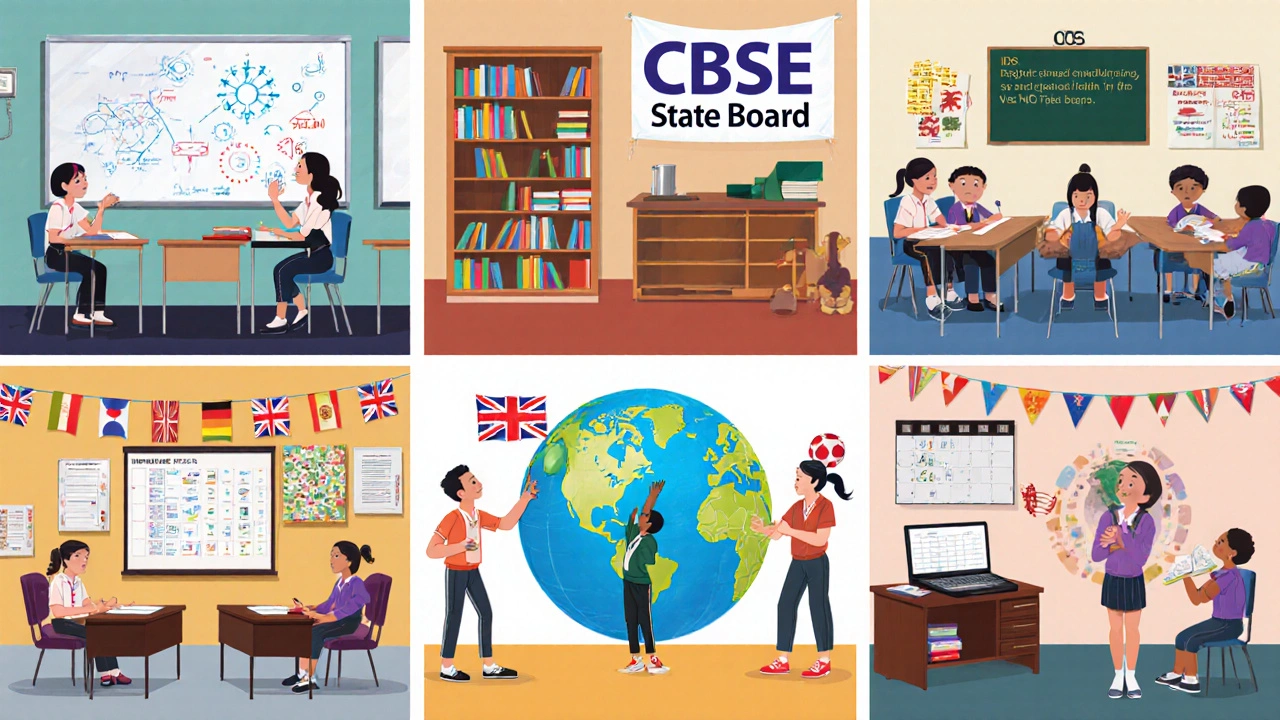Did you know that more than 20 million Indian students sit for a single school board exam each year? That massive scale gives the board huge sway over college admissions, scholarship opportunities, and even job prospects. If you’re a parent, student, or counselor wondering which board actually delivers the biggest payoff, you’re in the right place.
Education Board is a governing body that designs curricula, sets assessment standards, and issues certifications for schools across a region or nation. In India, several boards compete for attention, each promising a different mix of rigor, flexibility, and global recognition.
What Makes a Board "Valuable"?
Value isn’t a one‑size‑fits‑all metric. We’ll measure it against five practical criteria that matter to most Indian families:
- National Recognition: How widely accepted is the board’s certificate by Indian universities and government bodies?
- Curriculum Alignment with Competitive Exams: Does the board prepare students well for NEET, JEE, and other high‑stakes tests?
- International Portability: Can the certificate be used for admissions abroad without extra bridging courses?
- Teaching & Learning Approach: Does the board encourage critical thinking, project work, or pure rote memorisation?
- Scale & Resources: Number of schools, teacher training programmes, and digital tools available.
Major School Boards in India
Below is a quick snapshot of the six most common boards you’ll encounter.
CBSE (Central Board of Secondary Education) operates under the Indian Ministry of Education, serving over 21 million students in 22 000 schools nationwide.
ICSE (Indian Certificate of Secondary Education) is administered by the Council for the Indian School Certificate and is known for its comprehensive English‑medium syllabus.
State Board refers to the individual education boards of each Indian state (e.g., Maharashtra Board, Tamil Nadu Board) that tailor curricula to regional languages and priorities.
International Baccalaureate (IB) offers the Diploma Programme (DP) and is recognised by top universities worldwide.
IGCSE (International General Certificate of Secondary Education) is Cambridge‑based, providing an internationally benchmarked curriculum.
NIOS (National Institute of Open Schooling) is India’s open‑learning board, allowing flexible study schedules for working students.
Side‑by‑Side Comparison
| Board | National Recognition | Competitive‑Exam Alignment | International Portability | Teaching Approach | Student Base (millions) |
|---|---|---|---|---|---|
| CBSE | Very High (accepted by all Indian universities) | Excellent (syllabus mirrors NEET & JEE) | Good (recognised in many overseas institutions) | Balanced - theory + application | 21+ |
| ICSE | High (accepted by most Indian colleges) | Good (covers concepts but less direct exam prep) | Very Good (widely accepted abroad) | Concept‑driven, strong English focus | 0.5 |
| State Board | High within the state, variable nationally | Fair (often less rigorous for NEET/JEE) | Limited (often needs conversion exams) | Varies - many rote‑learning components | 7‑8 |
| IB Diploma | High (accepted by elite Indian colleges) | Fair (needs extra coaching for Indian exams) | Excellent (global university acceptance) | Inquiry‑based, project‑heavy | 0.02 |
| IGCSE | Medium (recognised by many private colleges) | Fair (covers basics, not tailored to NEET/JEE) | Excellent (British and Commonwealth recognition) | Balanced, international focus | 0.1 |
| NIOS | Medium (accepted by most Indian universities) | Fair (flexible pacing, less competition focus) | Good (recognized for overseas study) | Self‑paced, vocational options | 0.3 |
Why CBSE Leads the Pack
When you tally the five value criteria, CBSE consistently tops the scorecard. Here’s the breakdown:
- National Recognition: Every public university, IIT, and medical college lists CBSE as a primary eligibility road‑map. The board’s certificate is the default for government scholarships.
- Competitive‑Exam Alignment: The CBSE syllabus mirrors the physics, chemistry, and biology concepts tested in NEET, while its maths and physics sections line up closely with JEE. In 2024, 87 % of top‑ranked JEE‑Advanced candidates came from CBSE schools.
- International Portability: While not as universally accepted as the IB, the CBSE certificate is recognized by major UK, US, and Australian universities, especially when paired with standardised test scores (e.g., SAT, IELTS).
- Teaching Approach: Recent reforms (2022‑2024) introduced competency‑based learning, project work, and continuous assessment, reducing the pure‑rote bias.
- Scale & Resources: With over 21 million students, CBSE benefits from a massive digital ecosystem-e‑pathshala, online practice labs, and a nationwide teacher‑training network.

When Other Boards Might Beat CBSE
Even though CBSE scores highest on the overall value metric, specific scenarios favor other boards:
- International College Aspirations: Families targeting Europe or the US often prefer the IB or IGCSE for their strong global reputation and curriculum depth.
- Regional Language Emphasis: State Boards integrate local languages and cultural studies, which can be a deciding factor for parents wanting strong mother‑tongue proficiency.
- Flexibility Needs: NIOS offers a flexible timetable for working students or athletes who cannot attend regular school days.
- English Proficiency Focus: ICSE’s rigorous English curriculum gives students an edge in language‑intensive careers, like journalism or law.
Choosing the Right Board for Your Goal
Here’s a quick decision‑tree you can use:
- Plan to study at an Indian engineering or medical college? CBSE is the safest bet.
- Target a top‑tier overseas university? Consider IB or IGCSE for smoother admission.
- Want strong regional language skills and state‑specific scholarships? Look at the relevant State Board.
- Need a flexible schedule due to work, sports, or health? NIOS fits best.
- Prioritise elite English writing and literature training? ICSE is a solid choice.
Whichever board you pick, align your study habits early. Boards differ not just in content but in assessment style-some rely on internal exams, others on external board papers.
Future Outlook (2026‑2030)
Education policy in India is moving toward a unified competency‑based framework. By 2030, the Ministry plans to integrate best practices from CBSE, ICSE, and the IB into a single national curriculum. Until then, CBSE’s massive reach and exam‑focused design will likely keep it at the top of the value ladder.
Is CBSE really the most valuable board for university admissions?
Yes. All Indian central universities, IITs, and NITs list CBSE as a primary eligibility criterion. Moreover, the board’s syllabus is almost identical to the concepts tested in NEET and JEE, giving CBSE students a competitive edge.
Can an ICSE graduate still get into top engineering colleges?
Absolutely. ICSE students often need a little extra JEE coaching because the board’s maths and physics coverage isn’t as directly aligned with the exam, but many succeed with focused preparation.
What advantages does the IB Diploma offer over CBSE?
IB is recognized worldwide for its rigorous research component (Extended Essay) and emphasis on critical thinking, which can boost applications to Ivy League or UK Russell‑Group universities. However, IB students usually need extra coaching for NEET or JEE if they want to stay in India.
Is the State Board certificate enough for scholarships?
Many state governments offer scholarships based on merit within their own board. For national scholarships, students often need to clear additional eligibility exams, but the board’s certificate is still accepted by most Indian colleges.
How does NIOS compare in terms of cost and flexibility?
NIOS charges lower enrollment fees and allows students to study at their own pace, making it ideal for working professionals or athletes. The trade‑off is less structured classroom support compared to mainstream boards.





